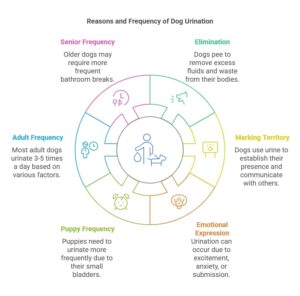As pet owners, we all want our furry friends to live happy, healthy lives. When it comes to digestive health, probiotics can be a game-changer for your dog. But one common question is: How long should a dog be on probiotics? Let’s break it down together in a friendly, approachable way, so you can feel confident in giving your pup the best care possible.
Table of Contents
ToggleWhat Are Probiotics for Dogs?
Probiotics are beneficial bacteria that live in your dog’s gut. They help maintain a healthy balance of good bacteria, supporting digestion, nutrient absorption, and even your dog’s immune system. Probiotics come in various forms, such as powders, chews, capsules, and even dog-friendly yogurt.
You can find great probiotic products like this highly-rated probiotic for dogs on Amazon to get started.
Why Might Your Dog Need Probiotics?
There are many reasons to consider probiotics for your dog. Some common ones include:
- Digestive Issues: If your dog experiences diarrhea, constipation, or bloating, probiotics can help restore gut balance.
- Antibiotic Use: Antibiotics kill both harmful and beneficial bacteria. Probiotics can replenish the good bacteria.
- Stress: Events like moving, traveling, or introducing a new pet can disrupt your dog’s gut health.
- Allergies and Skin Problems: A healthy gut can improve your dog’s overall immune response, helping to manage allergies.
How Long Should a Dog Stay on Probiotics?
The duration your dog should take probiotics depends on their specific needs. Let’s look at a few scenarios:
1. Short-Term Use
If your dog is recovering from an illness, antibiotic treatment, or a temporary digestive upset, probiotics can be used for a few weeks to a month. This allows enough time for the gut to rebalance and stabilize.
2. Long-Term Use
For dogs with chronic issues such as sensitive stomachs, recurring diarrhea, or allergies, long-term use may be beneficial. Many veterinarians recommend ongoing probiotics to maintain gut health and support the immune system.
3. Maintenance
Even if your dog doesn’t have noticeable issues, a daily probiotic can act as a preventative measure, promoting overall health. Some pet owners choose to give probiotics regularly as part of their dog’s wellness routine.
Signs Probiotics Are Working for Your Dog

When probiotics start to take effect, you may notice positive changes in your dog, such as:
- Improved stool consistency
- Less gas or bloating
- Shinier coat
- Better appetite and energy levels
- Reduced allergy symptoms
It usually takes about 1-3 weeks to see noticeable results, but every dog is different.
Can Dogs Stay on Probiotics Forever?
Yes, dogs can stay on probiotics indefinitely, especially if they are high-quality and vet-approved. Regular probiotics can be a natural and safe way to support your dog’s gut health long-term. However, it’s always a good idea to consult your veterinarian to ensure it’s the best choice for your pup.
FAQs About Probiotics for Dogs
1. Can probiotics have side effects on dogs?
Probiotics are generally safe but may cause mild side effects like gas or loose stools during the adjustment period. If symptoms persist, consult your vet.
2. When should I give my dog probiotics?
Probiotics can be given with meals for easier digestion and better absorption. Follow the product’s instructions for the best results.
3. Are human probiotics safe for dogs?
Human probiotics aren’t ideal for dogs because their gut bacteria differ from ours. Stick to dog-specific probiotics for the best results.
4. What if my dog refuses to eat probiotics?
You can try mixing probiotics into wet food or using flavored chews like this dog-friendly probiotic designed to be both effective and palatable.
5. Do probiotics help with anxiety in dogs?
Yes, a healthy gut-brain connection can influence your dog’s mood. Probiotics may help reduce stress and anxiety over time.
Final Thoughts
Probiotics can play an essential role in your dog’s health, whether for short-term support or long-term maintenance. Pay attention to your dog’s unique needs and consult your veterinarian to determine the best approach. If you’re ready to give your dog’s gut health a boost, check out this trusted probiotic to get started.
Your dog deserves the best, and with probiotics, you’re setting them up for a happier, healthier life!














